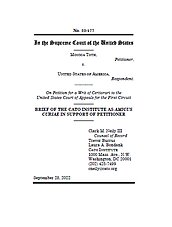Learn more about Cato’s Amicus Briefs Program.
Monica Toth was born in 1940 in South America and emigrated to the United States in her twenties. Before her father died, he gifted her a considerable amount of money that was held in a foreign bank account. Toth was unaware of a federal law requiring her to report the existence of this account to the IRS. As a result, she was later audited and assessed a penalty of $2,173,703 for failing to file a simple tax form.
The Bank Secrecy Act of 1970 requires U.S. citizens and residents to report the existence of any foreign bank account over $10,000 to the IRS by filing a Foreign Bank and Financial Accounts Report (FBAR). If a person fails to report the existence of an account, the IRS can impose a civil penalty up to half the value of the foreign account. In the case of 82-year-old Monica Toth, the IRS did just that. Toth challenged this penalty as violating Eighth Amendment’s Excessive Fines Clause, which simply says that “excessive fines” can’t be “imposed.” Fining someone over $2 million for the non-criminal act of failing to file paperwork certainly seems excessive, but the First Circuit denied her appeal, holding that the Excessive Fines Clause does not apply to civil FBAR penalties.
Toth has appealed to the Supreme Court, and Cato has filed an amicus brief in support of her petition. We argue that the original purpose of the Excessive Fines Clause was to limit the government’s ability to punish individuals through the imposition of excessive fines. For this reason, the Supreme Court has held that Excessive Fines Clause applies to both civil and criminal penalties.
The First Circuit, however, illegitimately limited the application of the Excessive Fines Clause to civil penalties. This holding conflicts with the original meaning of the Excessive Fines Clause and threatens one of the few protections Americans have against excessive civil penalties. Moreover, it creates harmful incentives for agencies to target enforcement toward profit. If the government is allowed to impose excessive civil penalties without constraint, agencies will undoubtedly target enforcement toward profitable conduct while ignoring less-profitable conduct that poses an actual threat to society.
The Supreme Court should grant Monica Toth’s petition for certiorari. This case presents an opportunity for the Court to extend Excessive Fines Clause protections to all civil penalties. Failing to do so will result in a departure from the original meaning of the Clause and will create harmful incentives for agencies to “police for profit.”

This work is licensed under a Creative Commons Attribution-NonCommercial-ShareAlike 4.0 International License.


